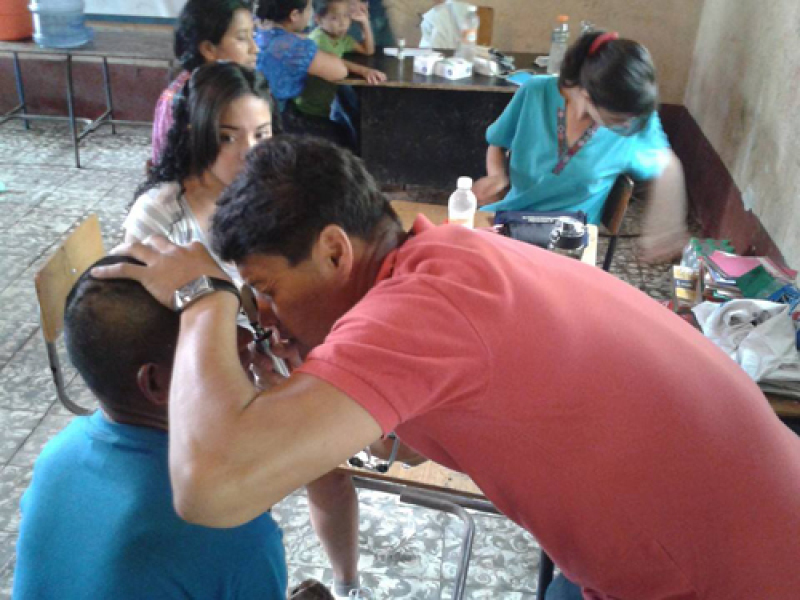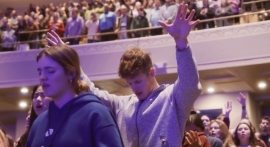

'Healing Guatemala' currently has a clinic in Bethesda, at which native doctors and Luke Rhyee are able to provide basic treatments and diagnoses.
"For to me, to live is Christ and to die is gain." (Philippians 1:21)
Luke M. Rhyee, a doctor, pastor, and president of the non-profit mission organization "Healing Guatemala,' said that he made the decision to live as a missionary as a young man 25 years ago when he saw an inscription on a missionary's tombstone.
Healing Guatemala is a gospel-centered non-profit organization founded by Rhyee to proclaim healing in Latin America. With headquarters in Guatemala, the United States, and South Korea, this organization has been founded on the hope that "every person in this land would be able to flourish in the healing"”physically, spiritually, and financially"”that comes from the Lord."
Rhyee, who graduated with a degree in medicine in 1991, opened a hospital after graduation and lived as a doctor who treated patients. He shared that he recommitted himself to obey the calling that God had given him as a missionary when his son, who was two years old at the time, had suffered a severe burn and had to be hospitalized. He then gave up his career as a doctor in Korea and moved to the United States, where he studied at Duke Divinity School. While he was actively doing ministry as the lead pastor of Columbia Korean United Methodist Church, Rhyee felt that the Lord was calling him to the mission field, and in January 2014, he and his wife, Sunhee, and his children, Joshua (11), Andre (7), and Daniel (5) decided to move to Guatemala.
It was difficult for the family to adjust to their new location at the alpine zones at 2,500 meters in elevation.
"After only a month of moving into the new location, my wife suffered from altitude sickness and contracted pulmonary edema," Rhyee shared. "Andre, who was seven at the time, started to develop obsessive-compulsive tendencies, and five-year-old Daniel started developing chronic tics. After a period of prayer, and with the help of a friend, we decided to stay in the U.S. for a while, so we prepared a home in Suwanee, Georgia in January. My wife and sons will be staying in the U.S. for their health, and for now I'll be going back to Guatemala on my own to continue ministry."
Though Guatemala, two-thirds of which are mountainous regions, is known to have a Christian population that is 40 percent of the total population, there are actually many who have not experienced God personally. Rhyee is residing in Quetzaltenango, an area known as the capital of the Mayan people. They call themselves "a people abandoned by the government" because of the wide gap between the rich and the poor that resulted from the civil war in the country. The Mayan tribes live off of one dollar per day or less, and live in complete poverty as they receive some $70 every two weeks by helping with odd jobs in neighboring farms.
Rhyee said that one aspect of the Healing Guatemala ministry is to provide treatment and medications to the impoverished at the clinic located in Bethesda, alongside native doctors.
Second, Healing Guatemala takes trips to remote areas once every month to provide treatments. A team consisting of five native doctors and two dentists go to an isolated area with 400 residents and provide basic diagnoses, check-ups, and surgeries. They also provide food to some 500 villagers with the partnership of local churches, and have a children's program in which 100 young children are able to listen to Bible lessons, play games, and make crafts.
Third, the ministry provides food to young children"”twice per week, to about 500 children in isolated mountain villages. In these areas, over 20 percent of children skip more than two meals each day.

Luke Rhyee, a doctor, pastor, and missionary, began his Healing Guatemala ministry in 2014.
"At first, I just wondered, how are we supposed to do ministry to such a great amount of people?" Rhyee said. "But God spoke to me and said that our job is just to offer this small amount of food to the Lord, and not worry about feeding all of the multitudes of people for six months. God receives our offering, and just like the miracle with the five thousand in which all ate and were satisfied and had 12 basketfuls of leftovers, we are praying and believing that he will do the same miracles here."
"The clinic that we use currently in Bethesda is actually so confined and small that it's been difficult to provide even the most basic treatment," Rhyee continued. "We are in desperate need of better facilities through partnerships with professional medical mission teams. We are planning to build a 3,000 square feet, one-story clinic, which would contain medical and dental outpatient units, check-up/diagnosis rooms, radiology units, a pharmacy, and surgery rooms. Short-term professional medical missionaries could use these rooms, but it would take about $70,000 to build. And once the clinic is built, we are also in need of medical equipment and missionaries to partner with."
"With the new clinic, we are also hoping to have native medical students to come in as interns and share life and medical skills together in partnership, and raise up native, skilled, and professional medical practitioners who can operate the clinic," Rhyee further shared.
"I hope that, at the time the Lord calls me home, on my tombstone it will be written, "I leave this life having lived it fully in faithfulness to the God who gave it to me.'"

















